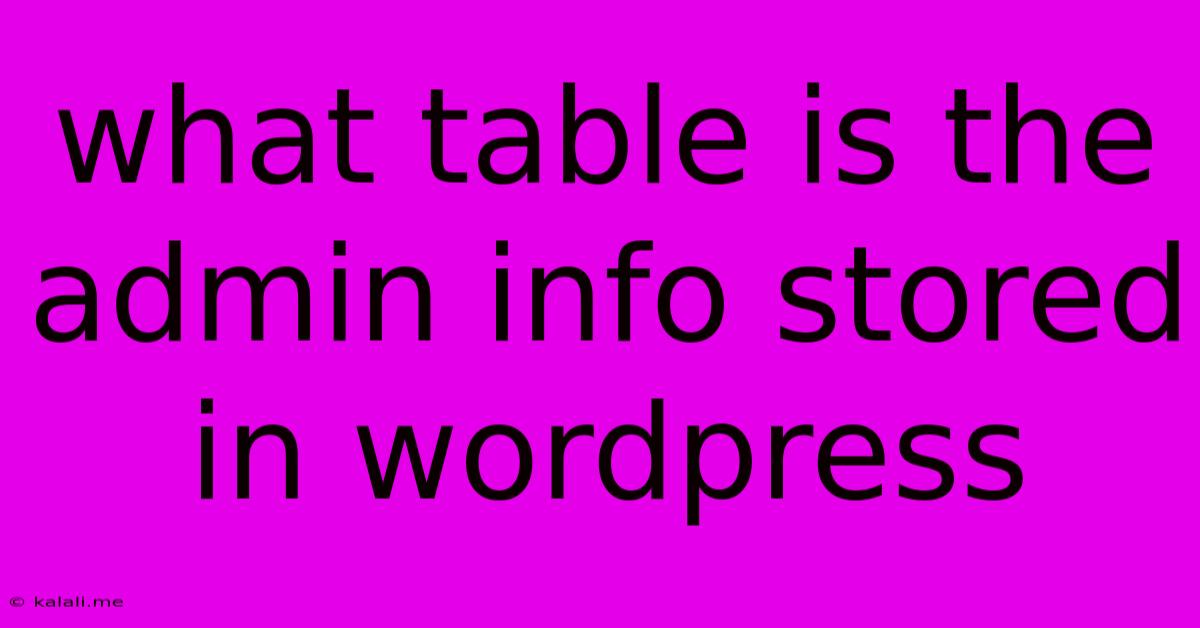What Table Is The Admin Info Stored In Wordpress
Kalali
May 31, 2025 · 3 min read

Table of Contents
What Table Stores Admin Information in WordPress?
WordPress, a powerful and flexible CMS, relies on a MySQL database to store all its data. Understanding the database structure is crucial for developers and advanced users, especially when troubleshooting issues or customizing functionality. This article dives deep into identifying the specific table that holds your WordPress administrator user information. If you're looking to manage user roles, permissions, or troubleshoot login problems, knowing this table is key.
The wp_users Table: Your WordPress Admin's Home
The core table where all WordPress user information, including administrator accounts, is stored is wp_users. This is the primary table you'll need to interact with for any user-related tasks. Note that the wp_ prefix might vary depending on your WordPress installation's database prefix. You can find your actual prefix in your wp-config.php file.
Key Columns within wp_users
The wp_users table contains several crucial columns that define your users. Let's look at some of the most important ones for admin users:
ID: A unique identifier for each user.user_login: The username used for logging in. This is typically the administrator's username.user_pass: Stores the password, hashed for security. Never attempt to directly access or modify this field without proper security precautions.user_nicename: A URL-friendly version of the username.user_email: The administrator's email address.user_registered: The date and time the user was registered.user_status: Indicates the user's status (e.g., active, inactive).display_name: The name displayed publicly.
Related Tables: Expanding the Picture
While wp_users contains the core information, other tables provide contextual data:
-
wp_usermeta: This table stores user metadata. Think of this as an extension of thewp_userstable, holding additional information not included in the core user fields. This includes roles (wp_capabilities), which determine the administrator's access level. For example, the administrator role grants access to all functions and features within the WordPress administration panel. This is particularly relevant when managing user permissions. Themeta_keycolumn will typically hold values likewp_capabilitiesto specify user roles. -
wp_user_roles: This isn't a direct table in the standard WordPress database setup, roles and capabilities are stored as serialized data within thewp_usermetatable, as mentioned above.
Accessing the Database: Cautions and Best Practices
Accessing and manipulating the database directly should be done with extreme caution. Incorrect modifications can severely damage your WordPress site. Always back up your database before making any changes. Using the WordPress API for user management is the recommended approach for safety and maintainability.
Remember, understanding the database structure can be incredibly valuable, but direct manipulation is best left to experienced developers. For routine user management tasks, always use the WordPress administrative interface. Direct database interaction should only be considered as a last resort for troubleshooting or specialized tasks requiring direct access to the database.
This guide provides a solid foundation for understanding where WordPress admin information is stored. By comprehending the structure of the wp_users and related tables, you can better navigate and manage your WordPress users effectively. Remember to always prioritize database security and best practices.
Latest Posts
Latest Posts
-
What Does The Bagel Button Do On A Toaster
Jun 01, 2025
-
Lightgbm Warning No Further Splits With Positive Gain Best Gain
Jun 01, 2025
-
Why Didnt Moses Enter The Promised Land
Jun 01, 2025
-
How Heavy Is A Barbell Without Weights
Jun 01, 2025
-
Add Subject Alternative Name To Ssl Certificate
Jun 01, 2025
Related Post
Thank you for visiting our website which covers about What Table Is The Admin Info Stored In Wordpress . We hope the information provided has been useful to you. Feel free to contact us if you have any questions or need further assistance. See you next time and don't miss to bookmark.